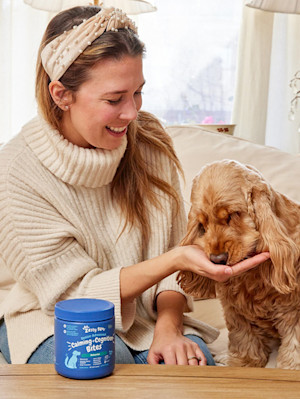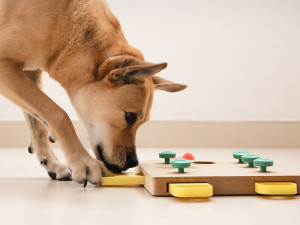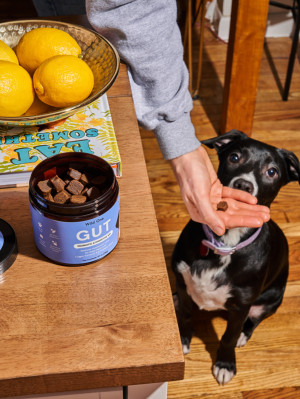How to Keep Your Dog’s Brain Healthy for as Long as Possible
What happens to a dog’s brain when they get older—and how you can slow it down.

Share Article
Sure, we think our dogs are little geniuses, but even if we are biased, there is some truth to that. Maybe they pick up tricks quickly, know how to choose a favorite ball, or convey affection in clever ways. They’re smart in their own perfect ways, so when they age and their cognitive abilities start to decline, it can be really scary.
If your dog is getting older, you’re likely looking out for those signs that their brain isn’t quite as peppy as it used to be (or you have a new, young dog, and you’re already worried about when that day will come). The good news is that it’s possible to keep their minds healthy for even longer, protecting those precious personalities we love so much.
But why do dogs’ brains have to decline at all?
Dr. Antje Joslin, the veterinary consultant at doggie daycare Dogtopiaopens in new tab, says that as dogs age, their brains undergo similar changes to the ones we see in humans: “Aging in dogs can lead to the degeneration of neurons and the accumulation of abnormal protein deposits in the brain. This can impair cognitive function.”
She adds that older dogs can often experience reduced blood flow to the brain, which can impact brain health and function. “Aging can also increase oxidative stress, where free radicals damage cells, including brain cells. Chronic low-level inflammation in the brain can contribute to cognitive decline, and levels of neurotransmitters can decrease with age, affecting cognitive abilities.”

As Dr. Joslin explains, there are many ways that our dogs’ brains can start to age, but we’re not likely to know that all of that is going on inside their cute heads. Instead, we’re likely to see the signs of decline in their behavior. Dr. Joslin says that there are many symptoms of cognitive difficulty that we should look out for, particularly when it comes to subtle changes in their behavior and mental function.
“Look for signs of disorientation, such as getting lost in familiar places or appearing confused about where they are. Another sign is a change in sleep/wake patterns, especially increased nighttime restlessness or disrupted sleep,” Dr. Joslin says. Some pets may also show changes in how they interact socially, either with people or other pets. They may even show increased signs of agitation.
How can you tell this is happening?
Dr. Mandala is the senior veterinary trainer at animal charity Animals Asiaopens in new tab. She adds that there are other signs of dementia, like your dog staring into space or not recognizing familiar people. “They can also show changes in their toileting and may be urinating or defecating indoors,” she says. If you notice any of these symptoms, particularly if they are persistent, both vets say that it is important to consult with a veterinarian.
“Especially if the signs of decline are worsening over time, or if you notice changes that interfere with daily life or the quality of your dog's life,” Dr. Joslin says. Dr. Mandala agrees: “Any time there’s any abnormality or change in the status of your dog, they should be seen by a veterinarian who will perform a complete exam and do some bloodwork, among other tests. Dogs should be seen regularly regardless of if signs are seen or not, so things can be picked up earlier than later.”
And how do you prevent it?
If you have an older pet (or even before they get older), it’s important and possible to try to prevent cognitive decline before it even rears its ugly head. Dr. Joslin says that you can take a similar approach to your dog’s brain health as you would to your own: “You can engage in mental stimulation, regular physical exercise, a healthy diet, social interaction, and environment enrichment,” she says, adding that, “dog daycare at a reputable facility is an excellent way to incorporate regular exercise, mental stimulation, social interaction, and enrichment into your dog’s life.”
Dr. Mandala agrees, saying “There’s no treatment for CDS (cognitive dysfunction syndrome), but keeping dogs healthy and fit throughout their whole lives will decrease the chance of having chronic illnesses that may predispose them to have it.”
Depending on their breed, there are steps that you can incorporate into your dog’s care to try to better their chances of having a healthy brain for longer. Dr. Joslin says that there are certain foods and supplements that are believed to support brain health, especially as dogs age.
“These include omega-3 fatty acids and antioxidant vitamins that combat oxidative stress. Some commercially available diets and treats include these supplements to help support brain health,” she says. Dr. Mandala agrees, and adds that there are prescription diets to treat cognitive disorders that you can discuss with your veterinary team.
“Always consult your veterinarian before starting any new diet, supplement, or treatment plan. They can offer guidance based on your dog’s specific health needs and conditions,” Dr. Joslin reminds us.
You can easily find these ingredients in dog food. Salmon is full of omega-3, while oily fish, like mackerel, sardines, and herring are easily incorporated into a diet. Additionally, the antioxidants in vitamins C and E are believed to fight free radicals, and you can find them in berries, leafy greens, and fruit. Asparagus, cabbage, and spinach are packed full of essential antioxidants.
You should always ensure that any ingredients you’re incorporating into your dog’s diet are safe for them to eat, and consult with your vet if you’re making a radical change, but those brain-boosting ingredients are out there. We all just want our dogs to be as possible for as long as possible. It can be scary to see them struggle with things they used to find easy, but if you take steps early, you can keep your pup bright for a very long time.

Marianne Eloise
Marianne Eloise’s work has appeared in The New York Times, The Guardian, The Cut, Vulture, and more. She is also the author of an essay collection Obsessive, Intrusive, Magical Thinkingopens in new tab. She has been going on adventures with her dog Bowie since she was 17.
Related articles
![Black dog sitting beneath a table being fed a Wild One GUT supplement]()
Best Probiotics for Dogs
Your pup should keep these in their medicine cabinet.
![Young caucasian cheerful blonde girl sitting and hugging her lovely cocker spaniel dog in cafe.]()
10 Longevity Tips From People Whose Pets Have Lived Incredibly Long Lives
Follow these vet-backed tips to help your best bud live a healthy and full life.
![Healing stone on Cavalier spaniel dog.]()
7 Human Wellness Trends Making Their Way Into the Pet Space
Your pet can benefit from your self-care practices, from CBD to acupuncture. (Yep, you read that right.)
![]()
13 Products Your Senior Dog Needs
From doggie diapers to toe grips, this gear will help your pet thrive through their golden years.
![A cat eating a plate of fish on a dining room table.]()
Could Fish Reduce Your Pet’s Carbon Footprint? It’s Complicated
All those cartoons of cats staring longingly at fish bowls might not be so far off. A new study suggests seafood in your pets’ diet could help sustainably meet the world’s protein needs.
![Pomeranian stands in front of a yellow bowl of homemade probiotic yogurt]()
Are Probiotics Actually Something Your Dog Needs?
Time for a (literal) gut check from four experts.









